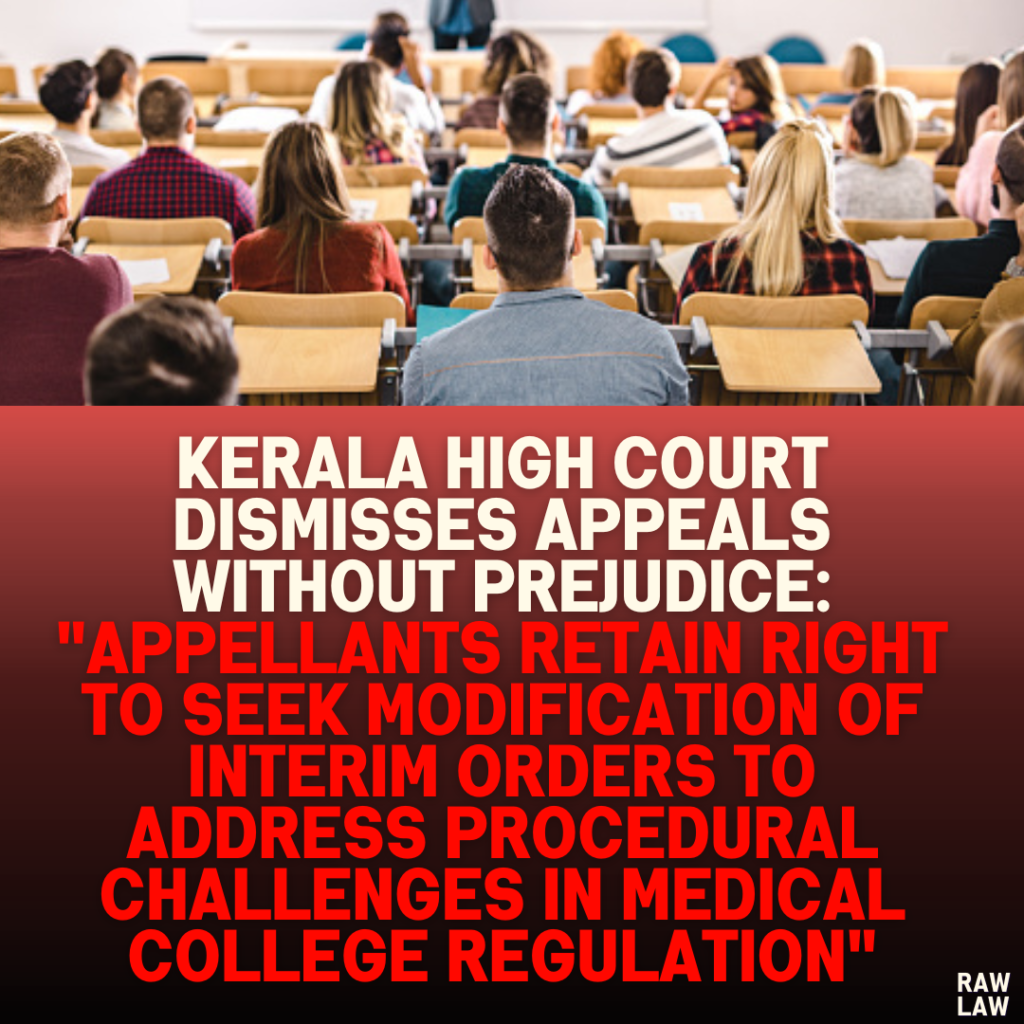Court’s Decision:
The Division Bench of the Kerala High Court dismissed the writ appeals filed by Kannur Medical College and others as withdrawn. The dismissal was done without prejudice, meaning the appellant’s right to seek relief before the Single Judge regarding the modification of the interim orders was preserved. The court clarified that the appellant could base their request for modifications on the final judgment in Writ Appeal 129/2024 and connected cases.
Facts:
- The appeals arose from various writ petitions filed against orders issued by the Single Judge. These orders pertained to disputes involving medical colleges, specifically Kannur Medical College, regarding compliance with regulations or other procedural matters.
- The appellant institutions contended that the interim orders adversely affected their functioning and required reconsideration.
- The appellants sought relief from the Division Bench, challenging the legality and impact of the interim orders issued by the Single Judge.
Issues:
- Validity of the Interim Orders: Whether the interim orders issued by the Single Judge were appropriate and legally justified.
- Appellants’ Right to Withdraw: Whether withdrawing the appeals would impact the appellant’s right to seek modification of the interim orders at a later stage.
- Implications of Writ Appeal 129/2024: How the final judgment in Writ Appeal 129/2024 and its connected cases would affect the interim orders under challenge.
Petitioner’s Arguments (Kannur Medical College and Others):
- The appellants argued that the interim orders by the Single Judge had created operational difficulties for the institutions.
- They submitted that subsequent developments, particularly the judgment in Writ Appeal 129/2024, necessitated a reconsideration of the interim orders.
- The appellants requested the Division Bench to allow them to withdraw the appeals so they could seek appropriate modifications from the Single Judge.
Respondent’s Arguments:
- The respondents supported the interim orders, asserting they were consistent with the statutory framework and intended to ensure compliance with regulations.
- They opposed any broad relief to the appellants, arguing that the matters should be appropriately addressed within the existing judicial framework.
Analysis of the Law:
- Withdrawal Without Prejudice:
- Under the procedural rules of the Kerala High Court, appellants are allowed to withdraw appeals without forfeiting their right to seek alternative remedies, provided such withdrawal is explicitly recorded as “without prejudice.”
- This mechanism ensures litigants can re-approach the judiciary if subsequent developments or judgments warrant a fresh challenge.
- Scope of Interim Orders:
- Interim orders are temporary measures designed to address immediate concerns pending final resolution. They are subject to modification based on new facts, evidence, or judgments.
- In this case, the appellant institutions retained the right to seek such modifications in light of the final judgment in Writ Appeal 129/2024.
- Relevance of Writ Appeal 129/2024:
- Writ Appeal 129/2024 likely involved legal principles or outcomes directly related to the appellant’s grievances. The Division Bench acknowledged its potential impact, allowing the appellants to pursue remedies consistent with that judgment.
Precedent Analysis:
The court referred to its earlier ruling in Writ Appeal 129/2024 and connected cases. The judgment in that case was deemed significant for the present matters as it likely clarified legal principles that could influence the modification of interim orders. The Division Bench emphasized that the withdrawal of appeals did not preclude reliance on this precedent when seeking relief.
Court’s Reasoning:
- The court recognized the appellant’s strategic decision to withdraw the appeals as a means to seek relief more effectively before the Single Judge.
- By dismissing the appeals without prejudice, the court ensured that the appellants retained the right to argue for modifications of the interim orders based on Writ Appeal 129/2024.
- The court’s decision aligned with procedural fairness, allowing appellants to utilize their rights within the framework of judicial remedies.
Conclusion:
The writ appeals were dismissed as withdrawn without prejudice. The appellants were allowed to approach the Single Judge to seek modifications of the interim orders impugned in the appeals. These modifications could be sought on the basis of legal principles established in Writ Appeal 129/2024 and its connected cases.
Implications:
- Litigants’ Rights: The decision reinforces the principle that withdrawal of an appeal does not close doors for pursuing alternative judicial remedies.
- Interim Order Flexibility: Institutions and parties affected by interim orders can seek modifications when new developments or precedents arise.
- Legal Precedence: The reliance on Writ Appeal 129/2024 underscores the importance of precedent in shaping judicial outcomes for related cases.
